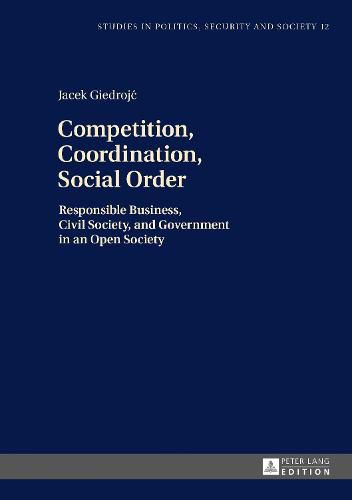Readings Newsletter
Become a Readings Member to make your shopping experience even easier.
Sign in or sign up for free!
You’re not far away from qualifying for FREE standard shipping within Australia
You’ve qualified for FREE standard shipping within Australia
The cart is loading…






This title is printed to order. This book may have been self-published. If so, we cannot guarantee the quality of the content. In the main most books will have gone through the editing process however some may not. We therefore suggest that you be aware of this before ordering this book. If in doubt check either the author or publisher’s details as we are unable to accept any returns unless they are faulty. Please contact us if you have any questions.
The author analyses competition as one of four coordinating mechanisms helping agents mutually to orientate their actions, avoid chaos, and produce social order. Competition is a key dimension of developed societies. It helps to structure and is also conducive to social change. Competing agents constrain one another, making it hard for anyone to change their position. They discover new routines the best of which may later be institutionalized. Competition is a solvent of power but only in relatively equal societies. Entrenched wealth or status restricts competition, thus impoverishing social order. The author also evaluates the theory of competition to explore such topics as corporate social responsibility, relations between government, business and civil society, and reflexivity in social sciences.
$9.00 standard shipping within Australia
FREE standard shipping within Australia for orders over $100.00
Express & International shipping calculated at checkout
This title is printed to order. This book may have been self-published. If so, we cannot guarantee the quality of the content. In the main most books will have gone through the editing process however some may not. We therefore suggest that you be aware of this before ordering this book. If in doubt check either the author or publisher’s details as we are unable to accept any returns unless they are faulty. Please contact us if you have any questions.
The author analyses competition as one of four coordinating mechanisms helping agents mutually to orientate their actions, avoid chaos, and produce social order. Competition is a key dimension of developed societies. It helps to structure and is also conducive to social change. Competing agents constrain one another, making it hard for anyone to change their position. They discover new routines the best of which may later be institutionalized. Competition is a solvent of power but only in relatively equal societies. Entrenched wealth or status restricts competition, thus impoverishing social order. The author also evaluates the theory of competition to explore such topics as corporate social responsibility, relations between government, business and civil society, and reflexivity in social sciences.